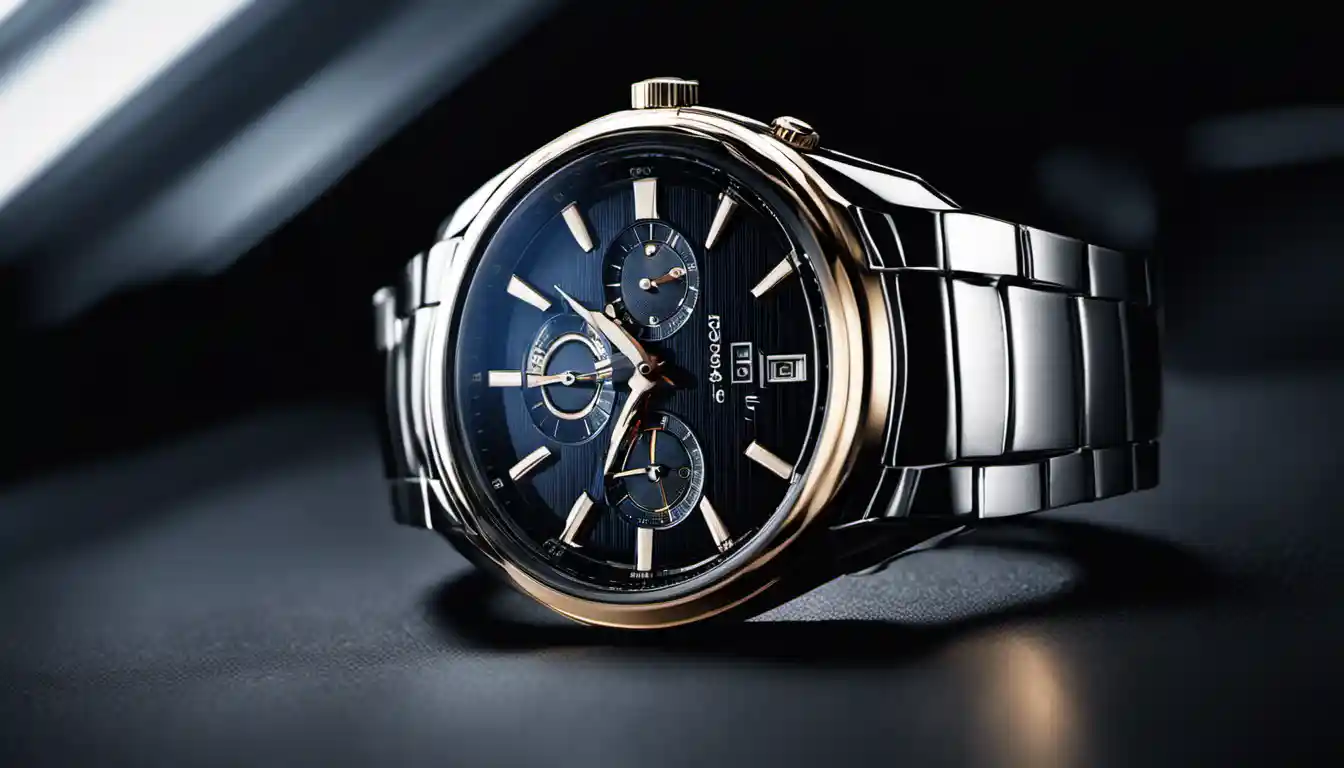Understanding Solar Watches
Solar watches can last for more than 10-20 years if they are well-maintained. Their built-in rechargeable batteries (secondary cells), which store sunlight energy, can last for 10-15 years, unlike normal watch batteries (primary cells) that last for 2-3 years.
What is a Solar Watch?
For those yet to embrace these pioneering timepieces, solar watches zealously gather any available light–natural and artificial–through a photovoltaic cell located beneath the dial. This light is then converted into energy, which is stored in a rechargeable cell, offering an environmentally friendly and more sustainable alternative to traditional watches. And the best part? You’ll hardly ever need to replace the battery.
Solar Watch Lifespan Overview
Average Life Expectancy of a Solar Watch
One common question I receive is: “How long do solar watches last?” To put it plainly, a well-built solar watch, even in mediocre lighting conditions can tick right alongside you for at least a decade or two. But, like most technological devices, much depends on the brand, the model, and, most importantly, how well it’s cared for.
Factors Influencing Solar Watch Lifespan
Impact of Brand and Cost on Lifespan
Brands like Citizen, Casio, or Seiko, who have invested in mastering solar technology, offer watches that could potentially last a lifetime. Generally speaking, the more expensive the watch, the higher the quality, and the longer it should last– but don’t simply take the price tag as the sole indicator of longevity.
Role of Recharging Frequency

A solar watch is like a loyal friend; it gives what it gets. Regular exposure to light means regular charging. When routinely fueled, these watches can continue to run consistently and accurately for years.
Depreciation Over Time
Solar watches, like all mechanical objects, depreciate over time. However, the rate of this wear and tear can be controlled by proper care and maintenance. Keep your eco-friendly timepiece clean, avoid extreme temperatures, and it’ll serve you reliably for years.
Deep Dive into Solar Watch Battery Life
How is Solar Battery Watch Life Span Calculated?
Solar watch battery life is typically calculated based on the capacity of the battery to hold a charge and the power consumption of the watch. Most solar watches have a “power save mode” that kicks in after a period of inactivity, ensuring minimal power consumption.
Lifespan of Casio G-Shock and Other Brand Batteries
Casio’s G-Shock line includes some exceptional models, as we’ve detailed on our “best-solar-powered-watches” page. Casio opines that if well-maintained, a G-Shock watch’s battery can last up to 10 years. However, under impeccable conditions, I’ve heard tales of them lasting even longer.
Factors Affecting G Shock Solar Battery Life
Factors like exposure to strong light sources, the frequency of the alarm usage, and the age of the watch itself can affect solar battery life.
Replacement Frequency for Solar Watch Batteries
Even though solar watches don’t require frequent battery replacements, they are not immortal. On average, the batteries may need to be replaced every 10-15 years, approximately 4-5 times less frequently compared to their quartz counterparts.
Troubleshooting Solar Watches

What if My Solar Watch Stops Working?
Possible Causes of Failure: Faulty Batteries
The most common cause is undercharged or expired batteries. If the watch hasn’t been sufficiently exposed to sunlight, it may stop.
Possible Causes of Failure: Long-Term Storage
The “hibernation” mode can also cause temporary stoppage. To conserve energy in light-deprived environments, some solar watches enter hibernation–a deep sleep of sorts. But don’t worry–they’ll spring back to life with a little light.
Possible Causes of Failure: Insufficient Natural or Artificial Lighting
Sometimes, your indoor lighting might just not cut it. Basking in the sunlight for a few hours can usually get your timepiece ticking again.
Is a Solar Watch Worth It?
Evaluating the Value of a Seiko Solar Watch and Other Brands

Brands like Seiko have internal mechanisms, high-quality cells, and innovative features that make them worth every penny. Remember, investing in a good solar watch is a long-term commitment and will save you the hassle and cost of constant battery replacements.
Understanding Solar Watch Depreciation
Like cars, solar watches also depreciate with time. However, certain high-end models and vintage pieces might even appreciate over time, making them not just a timekeeping tool, but a worthy investment.
Drawbacks and Benefits: Are Solar Watches a Good Investment?
Despite some drawbacks, “how long do solar watches last?” is compellingly answered by their durable construction, self-sustainable charging, and long battery lifespan, which undoubtedly make them a great investment for both the pocket and the planet.
Concluding Thoughts
Is It Worth to Buy and Maintain a Solar Watch?
With their eco-friendliness, long lifespan, and easy maintenance, it’s safe to say that solar watches are definitely worth considering.
Frequently Asked Questions about Solar Watch Lifespan
We’ve seen our fair share of FAQs about solar watches over the years. Rest assured, we’ll address all of them in the coming articles.
Takeaway: How to Make a Solar Watch Last Longer?
Providing proportional light exposure, regular cleaning, and keeping it away from extreme temperatures will ensure that your solar watch remains a loyal timekeeper for years to come.
So, do solar watches last forever? Well, while they may not tick along into infinity, they’re certainly in for the long haul—an eco-friendly companion for your everyday adventures!



